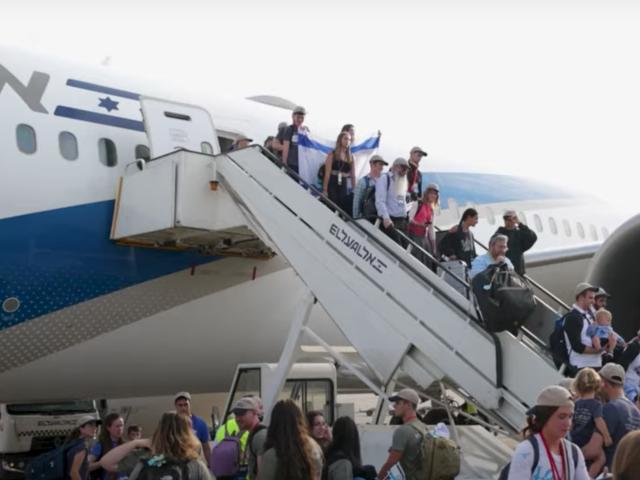The Committee for Immigration, Absorption, and Diaspora Affairs, chaired by MK Oded Forer (Yisrael Beitenu), convened on Sunday to address a critical issue: the sharp decline in immigration to Israel during the summer of 2024. The committee reviewed stark statistics from the Jewish Agency, highlighting a worrying trend that calls for immediate government intervention.
Alarming Drop in Immigration Numbers
According to the Jewish Agency, a mere 23,183 new immigrants arrived in Israel from January to August 2024, representing a dramatic 42% decrease compared to the same period last year. In 2023, a total of 47,012 new immigrants made Aliyah. This year, 14,514 immigrants arrived from Russia, 693 from Ukraine, and 546 from Belarus. While immigration from Western countries saw a slight uptick with 2,446 newcomers—marking a 50% increase compared to last year—this modest gain pales in comparison to the overall decline.
The influx from France was particularly notable, with 1,456 immigrants—a 76% increase over last year—along with 433 immigrants from the UK, representing a 55% rise. North America, Oceania, and South Africa contributed 2,760 new arrivals, an 11% increase from the previous year. However, not all regions fared well: the number of immigrants from South Africa dropped by 10%, and Oceania saw only a modest 20% increase.
Impact of the War on Aliyah
The ongoing security situation has cast a long shadow over Aliyah efforts. Since the start of the conflict, there has been a 19% decrease in the number of Aliyah applications opened worldwide, totaling 30,763. Russia, in particular, experienced a severe 45% drop, with only 13,203 applications filed between October 2023 and September 2024. Conversely, there has been a surprising surge in applications from Western nations, with the United States seeing a 60% increase and France a staggering 342% rise.
MK Forer did not mince words in his criticism of the government, labeling the declining immigration figures as a "badge of shame." He underscored the potential for increased immigration during times of crisis, emphasizing that Israel should be a sanctuary for Jews globally, not just those from Western Europe. "There are communities around the world that are begging to relocate to Israel, but they are not being given the adequate response," Forer stated. He called for a more robust and dynamic approach to capitalize on the resilience of the Jewish people.
Government Response and Future Prospects
Representatives from the Ministry of Aliyah and Integration, including Yana Bremer, highlighted ongoing efforts to bolster immigration, despite the daunting challenges. "Our investment in encouraging Aliyah will bear fruit," Bremer assured. She acknowledged the difficulty of promoting Aliyah from Russia and Ukraine but reaffirmed the ministry's commitment to continue their efforts.
BREAKING NEWS
— Chaya Eitan (@ChayaEitan) September 16, 2024
Israel Aliyah Centre in Melbourne shows a dramatic 170 per cent increase in aliyah inquiries since October 7 compared to the same period last year.https://t.co/bP5JPM6EZ9
Shimon Shamila of the Jewish Agency noted that since the outbreak of the Swords of Iron war, over 30,000 Jews have made Aliyah from around the world. However, he emphasized the need for more significant numbers from Russia and Ukraine, urging enhanced efforts in these regions. "The rising antisemitism worldwide is a significant catalyst for Aliyah, but it is not the only one," Shamila pointed out, expressing optimism that the year-end figures could still show improvement.
Calls for Reform and Improved Processes
The committee discussion also spotlighted bureaucratic inefficiencies that are hindering the immigration process. MK Forer called for a reduction in waiting times for immigration approvals, which currently extend to three months in Moscow and six months in Saint Petersburg. "A Jew living in Saint Petersburg is no less important than a Jew living in Paris," Forer declared, pressing for equitable prioritization across all regions.
Israel sees 42% drop in immigration in 2024 amid war, significant decline in opened Aliyah files: Since the beginning of the war, there has been a 19% decrease in the number of aliyah files opened worldwide compared to last year, with a total of… https://t.co/lybGLoJ5Of JPost pic.twitter.com/R6kjZL8u0v
— Jewish Community (@JComm_NewsFeeds) September 15, 2024
Despite the security concerns that have dampened interest in making Aliyah, particularly from post-Soviet countries, MK Forer called for urgent government action. He urged for increased investment in promoting Aliyah from former Soviet Union countries and improving the overall absorption process for immigrants worldwide. "The potential for Aliyah to Israel is not being realized, especially from countries like Russia and Ukraine," he lamented.
MK Avi Maoz, deputy minister in the Prime Minister’s Office, acknowledged the ongoing efforts to streamline the immigration process through digitization but admitted that reducing waiting times to less than two months remains a challenge due to entrenched bureaucratic hurdles.
Almost a year after the Oct. 7 Hamas attack, paradoxically, aliyah numbers decline by 43% even as interest in Israel and Jewish heritage and culture soars.https://t.co/YDbq3OpYqZ#Israel #aliyah #Canada #UnitedStates #October7 #Hamas #terrorism #hostages #bringthemhomenow…
— Israel Hayom English (@IsraelHayomEng) September 8, 2024
A Call to Action
In his concluding remarks, MK Forer called for a comprehensive reevaluation of government priorities, stressing the need for a proactive approach to support Jewish communities eager to make Israel their home. "The arrival of new immigrants to Israel, particularly during a war, is indicative of the resilience of the Jewish people. However, we are not fully capitalizing on this potential," he stated emphatically.
As Israel grapples with the complexities of immigration during turbulent times, the committee's message is clear: urgent reforms and renewed focus on Aliyah are necessary to fulfill the Zionist vision and ensure that Israel remains a beacon of hope for Jews worldwide.


